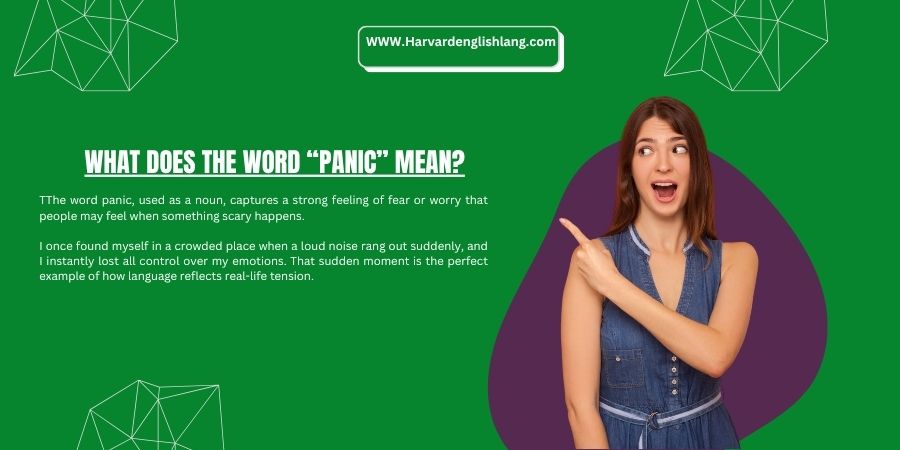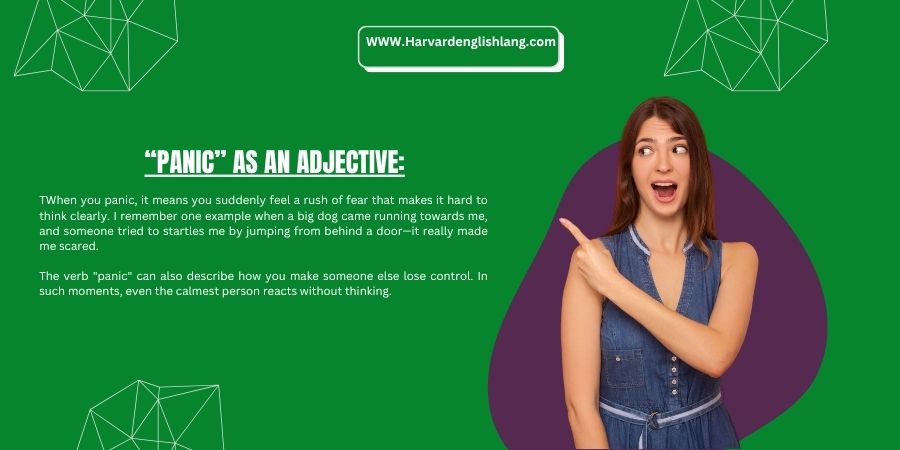I remember a moment when I completely panicked before a big presentation. My mind went freaking blank, and I couldn’t figure anything out. Later, I started thinking about why we get so tense under pressure and how our language reflects that.
If you explore the past, you’ll find that “panic” and “panicked” are more than grammar— they’re emotional puzzles tied to how we experience fear. This made me question not just word forms but how our brains react.
What does the Word “Panic” Mean?

The word panic, used as a noun, captures a strong feeling of fear or worry that people may feel when something scary happens.
I once found myself in a crowded place when a loud noise rang out suddenly, and I instantly lost all control over my emotions. That sudden moment is the perfect example of how language reflects real-life tension.
“Panic” as a Noun:
I once saw a person in a hurry, their face pale, eyes wide—completely panicked. That look perfectly describes someone acting out of deep fear, maybe because they had lost something really important. In that instance, just by looking, you could tell they were worried, scared, and a bit frantic. The way they were doing things without thinking clearly sees the emotional feeling that this adjective describes so well—totally afraid and overwhelmed.
“Panic” as an Adjective:

When you panic, it means you suddenly feel a rush of fear that makes it hard to think clearly. I remember one example when a big dog came running towards me, and someone tried to startles me by jumping from behind a door—it really made me scared.
The verb “panic” can also describe how you make someone else lose control. In such moments, even the calmest person reacts without thinking.
“Panic” as a Verb:
In English, when we talk about things that happened in the past, we often change the form of verbs. A regular verb like panic follows the common rule—you simply add “-ed” to the base word to show the tense. That’s how we get panicked, which is the correct written and spoken form. Some people mistakenly write paniced, but that’s incorrect and can be mispronounced as “pa-ni-ced.”
The extra “k” in panicked helps with pronunciation and ensures clarity. It keeps the sound correct, maintains consistency, and prevents confusion when speaking aloud.
I’ve seen even fluent writers struggle with this, often using the wrong form without knowing the reason behind adding the “k”. But learning this small spelling detail helps you stay accurate and polished in your writing.
You Might Also like: Hibiscuses or Hibisci
Past Tense of Panic
The word panic is pronounced /ˈpænɪk/ with stress on the first syllable, and it rhymes with words like manic or titanic. Its past tense form, panicked, is pronounced /ˈpænɪkt/, and sounds like licked or picked—this keeps both forms easy to say and clear in meaning.
The Simple Verb Tense Table
| Tense | Example | Description |
| Present | I panic | Action that is happening right now |
| Present Continuous | I am panicking | Action continuing in the present |
| Present Perfect | I have panicked | Completed action with relevance to the present |
| Present Perfect Continuous | I have been panicking | Action started in the past and is still ongoing |
| Past | I panicked | Action that happened in the past |
| Past Continuous | I was panicking | Action ongoing in the past |
| Past Perfect | I had panicked | Action completed before another past point |
Usage of “Panic” and “Panicked” in Everyday Conversations
Panic:
- She realized she had left her wallet at home just moments before boarding the bus—a moment of pure panic washed over her.
- He was driving through an unfamiliar neighborhood when he felt a surge of panic—he was completely lost and unsure where to turn.
- The news of an impending storm quickly caused widespread panic among residents, especially those living close to the coast.
- There was a strong sense of urgency in her voice when she called for help—you could hear the panic in every word.
- A sudden drop in stock prices led investors to panic, many selling off shares out of fear rather than reason.
- “Don’t give in to panic, we’ll find a solution to this problem together,” I told my team, reminding everyone how important it is to think rationally and remain calm in tense moments.
You Might Also like: Base or Bass
Panicked:
- She panicked when she heard fireworks, and her dog ran away due to the loud sound.
- I couldn’t find my passport just before my flight, and for a moment, I truly panicked.
- He dropped his phone after a loud crash happened right behind him.
- She saw the deadline approaching and hadn’t finished her assignment, which made her feel overwhelmed.
- The students realized they hadn’t studied enough for the exam and panicked in the classroom.
- The driver saw a car swerving into his lane and braked suddenly to avoid a crash.
Synonyms of Panic
- Alarm
- Distress
- Frenzy
- Hysteria
- Terror
- Anxiety
- Dread
- Fear
- Consternation
- Turmoil
Conclusion
When we talking about intense feelings, it’s important to know the difference between panic and panicked.
These words help us communicate our emotions more clearly and express how we felt in that suddenly overwhelming moment.
Whether you’re feeling nervous or have already panicked, having a deeper understanding of these terms helps us connect with others. I remember a time I felt totally scared, but being able to talking it through made a big difference. Understanding the words we use is key to expressing emotions better.

An IELTS and TOEFL expert who has guided hundreds of students to achieve high scores. His strategic approach to exam preparation ensures confidence and success.
